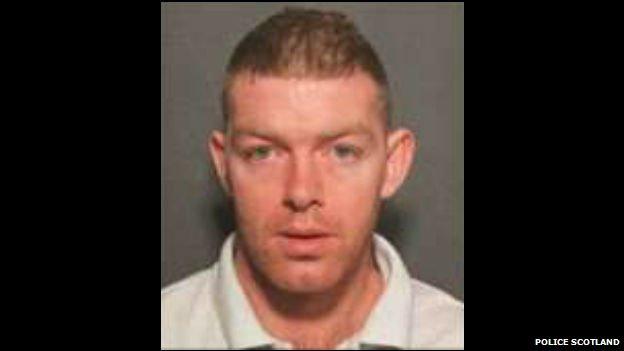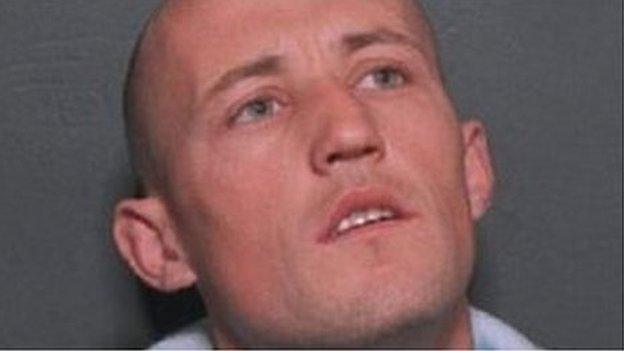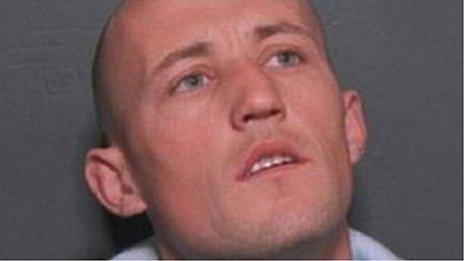Kevin Carroll murder: Closing speeches at trial
- Published

The prosecution said William Paterson's guilt was "beyond doubt"
Jurors in the Kevin "Gerbil" Carroll murder trial have been hearing closing speeches from the Crown and defence.
Prosecutor Iain McSporran QC told the High Court in Glasgow the case against William Paterson was circumstantial but his guilt was beyond doubt.
Des Finnieston, defending, said eyewitness descriptions did not "in any shape" look like the 35-year-old.
Mr Paterson denies shooting 29-year-old gangland figure Mr Carroll in an Asda carpark in Glasgow on 13 January 2010.
In his summing up, Mr McSporran described the shooting as "a brazen, organised assassination" that put the public at risk in the carpark in Robroyston.

Kevin Carroll was killed in an Asda car park in Robroyston
He told the jury: "There are no eyewitnesses, no confession to police, it is just a circumstantial case, that's all I've got.
"But what more could you possibly need?"
Mr McSporran also invited jurors to consider Mr Paterson's DNA on the handle of a bag that one of the murder weapons was found in.
He said that the DNA of Mr Paterson's "associate" Ross Monaghan - who was cleared of the murder in 2012 - was found on the handle of the other gun.
He said: "What do we find on the handle of the carrier bag containing the other gun? Unchallenged and undisputed DNA of William Paterson."
The court was told that "10 days after the shooting with the police investigation in full flow" Mr Paterson left Scotland for Spain.
Mr McSporran spoke to the the jury about telephone evidence suggesting a mobile phone attributed to Mr Paterson by police, ending in 1411, was near the scene of Asda at the time of the shooting.
He said the phone told the story "just as clearly as if we could see it happening ourselves".
In evidence the jury heard about another phone which was accepted as being Mr Paterson's.
'Joined at the hip'
Mr McSporran invited them to accept that both phones belonged to the murder accused.
The court heard that both phones were "co-located", meaning they were active within five minutes of each other and on 87 different occasions throughout January 2010, never contacted one another and were always in the same area.
A phone expert said if the phones belonged to different people they would need to be "joined at the hip".
Mr McSporran said: "Much more obvious you may think, in the same person's possession."
He said that the 1411 number could be traced to the area where the Volkswagen Golf - believed to have been involved in the shooting - was captured on CCTV a short distance away from Asda shortly before the murder.
He said that the phone was traced near Asda at the time of the murder, then at the area where the weapons were dumped.
Mr McSporran said: "It's as plain as can be from evidence that 1411 was in that Golf, in the possession of the driver, or one of the two gunmen."
He told the jury that the phone received a call "seconds before the shooting" and added: "You're not going to be taking calls when you are about to kill someone."
Mr McSporran added: "Whoever made that call enables us to say that phone, that man was right at Asda right at the time of the shooting."
'Tremendous breakthrough'
He described it as a "tremendous breakthrough" for police and "bad luck for William Paterson".
The prosecutor also said that another man had the 1411 number stored in his phone under the name "Billy".
He said that at 14:11 that day the phone is turned off.
He said: "It's served its purpose, it's the criminal phone."
In his speech, Mr Finnieston said that his client went to Spain where, according to a member of his family who gave evidence, he has worked before.
He said: "We know this man volunteered to come back. He gave himself up with a view to being extradited."
The jury were told he left when there was no warrant for him and he returned afterwards.
The lawyer said Mr Paterson returned "on the basis he is innocent".
Mr Finneston said that from evidence it was heard that DNA has an indeterminate date.
'No direct evidence'
He said it does not mean Mr Paterson touched any gun or that guns were in the bag when he touched the handle his DNA was later found on.
In relation to the 1411 phone he said there was "no direct evidence" to say that the phone was Mr Paterson's and that he had it on the day of the shooting.
Mr Finnieston said that according to an expert phone witness the phone could equally have been used by Victor Gallagher - one of the men Paterson is incriminating - who also stayed in the Cumbernauld area.
The defence solicitor advocate also said that eye witnesses described two people at the scene being the gunmen and one of them getting in and out of the driver's seat.
He said the descriptions given of them were too short to be Mr Paterson who is over 6ft tall.
The jury were invited to return a verdict acquitting Mr Paterson of the charges.
Mr Finnieston said it was the "proper, just and safe" verdict.
Mr Paterson denies the charges against him and has incriminated six other people.
He has lodged a special defence of alibi claiming he was at an address in Cumbernauld at the time of the shooting.
The trial before judge Lord Armstrong continues.
- Published21 May 2015

- Published19 May 2015

- Published15 May 2015

- Published14 May 2015

- Published13 May 2015

- Published12 May 2015
